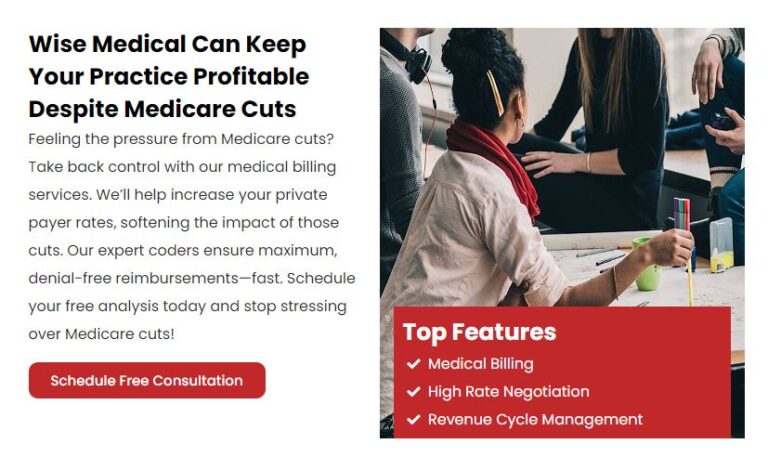ASCs Pushed to ‘Breaking Point’ as Difference Grows Between Reimbursement and Costs
— How to Stay Profitable
Ambulatory surgery centers (ASCs) are an essential part of the healthcare system, which faces a conflict between sustainability and profitability due to numerous financial issues. These issues are related to the high wage demand of employees, barriers in payment collection, complex rent policies to establish surgery practices, and high-deductible plans. Their aim of providing cost-effective and efficient surgery services is becoming more challenging due to the difference between reimbursements and operational costs. These issues must be addressed promptly to ensure the viability and continuous success of ASCs. This guide will provide a detailed overview of the problems faced by ASCs, involving factors and valuable solutions to stay profitable.
Current Financial Challenges for ASCs
ASCs are struggling for various financial resources, which pressures their operational capabilities and patients’ quality of health. The high deductible rates have reduced reimbursement rates, and patients’ financial responsibilities have increased. Due to low economic resources, surgical practices cannot provide additional perks for patients and staff, which directly influences the efficiency of the services. As a result of all these challenges, ASCs will become worse in terms of financial facilities and the delivery of low-quality healthcare.
Statistics and Trends:
According to recent reports, the cost of medical supplies has increased 5-7% compared to previous years. Staff salaries received a 4-6% annual increment, whereas reimbursement rates decreased 1-2% annually. This gap between reimbursement rates and operational costs disturbed a balanced situation to maintain profitability and sustainability. The financial stress is leading ASCs to need help to keep their financial stability.
Key Factors Contributing to Financial Strain:
- Rising Operational Costs: Due to inflation in the market and disturbance in balanced distribution, the medical supplies’ rate has increased. Moreover, they need to offer high salaries to hire skilled staff, but financial crises constrain them from compromising on lower wages. Advanced technology-based equipment delivers high-quality health, but its high prices make it unreachable. All these operational costs disturb ASC’s budget and lead to low-quality healthcare delivery.
- Declining Reimbursements: The government consistently decreases reimbursement rates, while some private insurance providers have also minimized the compensation rates for service providers, which results in high clinical costs and less patient satisfaction.
- Regulatory and Compliance Costs: The ASCs’ practices bear additional expenses for compliance with regulatory authorities, including reporting and maintaining data records, which requires extra hiring and technology. In case of non-compliance, they face severe penalties and expenses for quick financial audits.
Detailed Analysis of Contributing Factors
Here is detailed information about the factors that are creating financial challenges for ASCs:
Operational Costs:
- Operational costs include all expenses that ASCs spend to run their operations and deliver excellent patient-centric services. All operational expenses are staff salaries, rents, utility bills, the initial cost of technology, ongoing maintenance, and the upgrade of existing resources.
- Inflation has profoundly impacted financial costs. The rates of technology and supplies have increased. Due to the high cost of living, staff demand high salaries, and ASCs need to offer competitive salaries to attract skilled personnel. All these factors contribute to increasing operational costs.
Reimbursement Issues:
- Recent policy adjustments in insurance policies offered by government or private providers decreased reimbursement rates and high deductibles. The extra financial burden on patients raised a billing ambiguity. The high cost of services makes them unable to manage their financial responsibilities, and ASCs are struggling more with payment collections.
- The reforms in healthcare policies and insurance provider rates have influenced reimbursement rates, and patients are managing a large portion of their medical bills from their personal wallets. High-quality services deliver more beneficial results, but their price constrains patients and healthcare providers from maintaining the average.
Regulatory and Compliance Costs:
- The ASCs initially invest in EHR systems, high-quality equipment, ongoing staff training about personalized policies, and other requirements for adherence to healthcare standards. These non-compensate charges affect practices’ financial health.
- The additional expenses on personal behalf create a challenging situation for ASCs, making it hard to balance quality care and financial stability.
Strategies to Stay Profitable
The following are the optimal strategies to solve the financial stress of ASCs; a quick implementation can give ever-lasting results in maintaining quality and financial stability:
Cost Management:
- Group Purchasing Organizations (GPOs): Partnerships with GPOs can prove cost-effective and time-saving because bulk purchasing can save on per-unit tax costs, and they have already set discounted prices by negotiating with suppliers. Their partnership can provide unique access for distributors and suppliers to make operational tools budget-friendly.
- Efficiency in Scheduling and Utilization: Using advanced tools to optimize the operational rooms can enhance utilization and minimize downtime while maximizing throughput. Optimizing processes and involved factors helps to reduce turnaround time, and a physician can attend to maximum patients by streamlining the process.
- Staffing Optimization: hiring cross-trained staff can prove beneficial and cost-effective because of their ability to handle multiple roles, which saves the cost of additional hiring and has flexibility. They are using a mix of staff and cross-training to reduce labor costs. Mixing staff with full-time, day, and night shifts helps match the levels of patient care.
Revenue Enhancement:
Here are the strategies that can maximize revenue by avoiding revenue leakage in ASCs:
- Revenue Cycle Management: The practices should collaborate with billing companies to ensure that their billing codes are up-to-date and according to regulation requirements. This helps reduce denial claims and facilitate payment collection. They should send the billing claims as soon as possible because late submission can affect cash flow. To optimize their billing process, the practices should arrange internal audits to identify areas for improvement.
- Negotiating Better Reimbursement Rates: The billing practices should negotiate with reimbursement payers for fair and acceptable charges for their rendered services. Audits of performance metrics, patient satisfaction, and outcomes after receiving services from ASCs can help in solid negotiation. All these points can strengthen the negotiation. The practices should build a strong relationship with payers to communicate about reimbursement openly and discuss the market trends to comply with market standards.
- Expanding Service Offerings: The practices should evaluate market trends and unavailable demand procedures at other ASCs. New and unique technology additions can attract more patients and enhance revenue. The current or previous patients’ feedback can better guide other patients’ needs and preferences. The new additions should be advertised on social media, websites, and patient newsletters.
How Billing Companies Can Help?
Billing companies are essential to the healthcare system, and their role in enhancing revenue cannot be minimized. Here is a detailed overview of billing companies that generate high cash flow for ASCs.
Expertise in Revenue Cycle Management:
Billing companies have efficient teams to handle billing cases. These teams are field experts with fresh knowledge about coding billing submission and revenue management. Their accurate coding and efficient management of denials reduce revenue leakage. They always stay updated with industry standards and changing regulations to comply on time. These efficiencies can save physicians from penalty and reduce audit risks. Billing companies can provide detailed analyses of performance metrics, which guide them in identifying the required improvements.
Technology Integration:
Billing companies use advanced and streamlined software with EHR systems; this advancement reduces manual errors and enhances the speed of claim submission. Technology automation also reduces the administrative burden because daily tasks, such as patient invoices, claim submission, and payment posting, can be performed without delay and error. Their technology-based tools are working on high-security measures to provide full protection for patient information and their financial challenges, which helps in compliance with HIPAA regulations.
Patient Payment Solutions:
Billing companies are experts in offering customized payment options according to a patient’s financial condition, which helps collect maximum payment quickly. For example, they provide payment portals, online payment through mobile phones, and automated payment plans. They handle all payment tasks, including sending statements, answering patient inquiries, and enhancing patient satisfaction by providing precise and manageable options. To improve billing accuracy, the billing companies can also check the insurance eligibility to ensure accurate services and reduce denials.
Focus on Core Medical Services:
Outsourcing billing and administrative tasks to someone like Wise Medical Billing gives medical practices enough time to focus on patient health and provide excellent services to increase their credibility score. Billing efficiency also improves when all tasks are handled by field experts with comprehensive knowledge and the latest technology. Medical practices can introduce new opportunities and handle challenges if billing issues are monitored by experts, which ensures streamlined care for patients.
Final Analysis
Financial billing issues and other administrative challenges are affecting the working capability of medical practices. Therefore, it is crucial to resolve them urgently because ASCs are a critical part of the quality health of patients. The financial issues affect the annual revenue and quality of patient care. The overburden of administrative tasks, the high cost of operational tools, and the increasing wages have become challenging situations for ASCs in balancing profitability and sustainability. Partnerships with medical billing like Wise Medical Billing can save from many hassles and allow ASCs to tackle all challenges efficiently. Outsourcing hiring provides a chance to handle billing affairs by experts. This collaboration can prove beneficial for medical practices as well as for patients.

